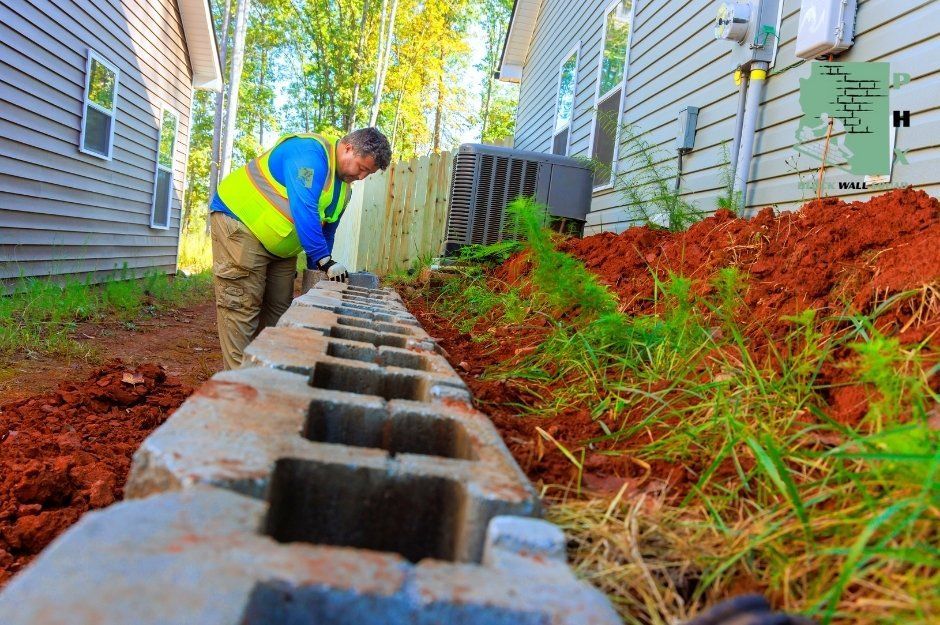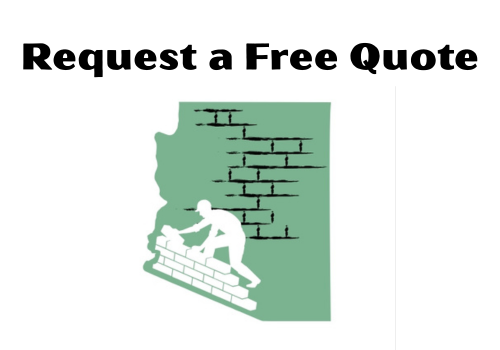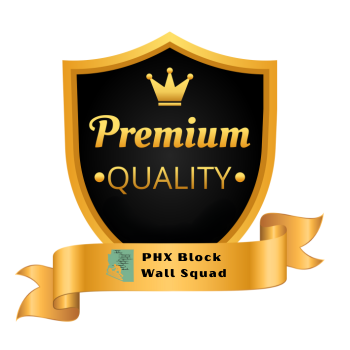Liberty Block Wall Repair
Block Retaining Wall Repair in Liberty, Arizona | Leaning & Erosion Control Solutions

Block walls serve as essential structures for property boundaries, security, and soil retention. When these walls show signs of damage like cracks, leaning, or water deterioration, prompt professional attention becomes crucial to prevent further issues and maintain your property's value.
Licensed block wall repair contractors at PHX Block Wall Squad in Liberty, AZ provide comprehensive services including crack repair, wall stabilization, structural reinforcement, and waterproofing solutions to address both minor and major wall damage. These experts utilize specialized techniques and materials to restore the integrity of your block walls.


Given Liberty's location in Maricopa County's desert climate, approximately 30 miles west of Phoenix, block walls face unique challenges from extreme temperature fluctuations and minimal annual rainfall that can cause thermal expansion and contraction damage.
Your block wall's condition directly impacts your property's safety and appearance. Professional contractors assess the extent of damage, identify underlying causes, and implement targeted repairs to ensure long-term stability. From fixing hairline cracks to addressing serious foundation issues, local contractors offer the expertise needed to maintain and restore your block walls effectively. In Liberty's small community of 63 residents (2000 census), word-of-mouth recommendations from neighbors in the surrounding Buckeye and Goodyear areas often guide homeowners to trusted local contractors.
Block Wall Repair Services in Liberty, AZ
Professional block wall repair services protect your property's structural integrity and aesthetic appeal through specialized repair techniques and expert craftsmanship. Local contractors deliver targeted solutions for various wall issues using industry-standard materials and methods. Liberty's position at the intersection of South Jackrabbit Trail and West Baseline Road places many properties along major transportation corridors where dust, vibration from traffic, and exposure can accelerate block wall deterioration.
Types of Block Wall Damage: Cracks, Leaning, and Water Issues
Structural cracks often appear due to soil settlement, foundation issues, or extreme weather conditions. These cracks can range from hairline fractures to severe splits that compromise wall stability. In Liberty's desert environment, the caliche clay soil common throughout Maricopa County can expand and contract dramatically during Arizona's monsoon season, creating significant pressure on block wall foundations.
Leaning walls typically result from poor drainage, inadequate construction, or soil pressure. You'll notice tilting or bulging sections that require immediate attention to prevent collapse.
Water damage manifests through efflorescence, spalling, or deteriorating mortar joints. Proper waterproofing and drainage solutions protect your block wall from moisture-related issues. Despite Liberty's arid climate with less than 8 inches of annual rainfall, the intense monsoon storms that occur between July and September can cause rapid water damage to improperly sealed block walls.
Block Wall Repair Process and Techniques
Professional contractors begin with a thorough inspection to identify damage extent and underlying causes. They document all issues and create a detailed repair plan.
Common repair methods include:
- Crack injection with epoxy or specialized fillers
- Steel reinforcement installation
- Mortar joint repointing
- Foundation stabilization
- Drainage system improvements
Contractors use high-quality materials designed specifically for block wall repairs. This ensures long-lasting results and prevents future damage. Materials must be specially selected for Arizona's intense UV exposure, with some areas receiving over 300 days of sunshine annually, requiring UV-resistant sealants and coatings.
Choosing Experienced Block Wall Contractors
Look for contractors with proper licensing and insurance coverage specific to masonry work in Arizona. Contractors serving Liberty should be familiar with the historical settlement patterns of the area, originally known as Altamount and later called Toothaker Place after the first postmaster Harriet Toothaker, which helps them understand older construction methods used in established properties.
Ask potential contractors about their experience with similar repair projects and request recent references.
Key qualifications to verify:
- State contractor licensing
- Local business presence
- Proven track record
- Written warranties
- Detailed cost estimates
Service Areas and Local Expertise
Liberty area contractors understand local soil conditions and building codes that affect block wall performance. The unique desert soil composition found in Census Tract 506.01, where Liberty is located, requires contractors experienced with the specific challenges of building in Maricopa County's southwestern region.
They serve residential and commercial properties throughout Liberty and surrounding communities in Arizona's West Valley. This includes the expanded Liberty Elementary School District service area that now encompasses much of Buckeye and Goodyear, requiring contractors to understand varying soil conditions across this broader geographical region.
Local expertise enables faster response times for emergency repairs and better coordination with municipal permitting offices. Being located just 6 miles southeast of Buckeye, Liberty residents often benefit from contractor networks that serve the rapidly growing West Valley corridor.
Most contractors offer free on-site evaluations to assess your wall's condition and provide accurate repair estimates.
Retaining Wall Repair and Restoration
Retaining walls require professional repair services to maintain their structural integrity and prevent soil erosion. Expert restoration techniques address common issues like soil pressure damage, cracking, and water-related deterioration.
Retaining Wall Issues: Soil Pressure, Erosion, and Structural Stability
Soil pressure poses a significant threat to retaining walls, especially during heavy rainfall when saturated earth exerts additional force against the structure. In Liberty's desert location, flash flooding during monsoon season can create sudden, intense soil pressure that overwhelms retaining walls not designed for Arizona's extreme weather patterns.
Water accumulation behind the wall can lead to drainage problems, causing erosion and weakening the wall's foundation. Look for signs like bulging sections or tilting, which indicate pressure-related stress.
Freeze-thaw cycles create cracks and deterioration in the wall material, while poor drainage systems allow water to pool and compromise stability. Watch for crumbling mortar, separated blocks, or visible gaps between materials. Although Liberty experiences mild winters compared to northern Arizona, the occasional freeze events combined with rapid thawing during sunny winter days can still cause thermal stress in block walls.
Retaining Wall Repair Solutions and Methods
Professional repair teams use specialized techniques to stabilize and reinforce damaged retaining walls. Crack injection with epoxy or polyurethane helps seal existing fissures and prevent water infiltration.
Installing proper drainage systems, including weep holes and gravel backfill, reduces hydrostatic pressure. Tiebacks and anchors can strengthen walls experiencing significant lean or movement.
Replacing damaged blocks or stones maintains structural integrity. New mortar joints and waterproof sealants protect against future water damage.
Retaining Wall Design and Materials
Common Materials:
- Concrete blocks
- Natural stone
- Poured concrete
- Timber (pressure-treated)
Strong retaining wall design incorporates proper base preparation with compacted gravel and adequate footer depth. Professional installation ensures correct wall batter (tilt) for optimal soil pressure resistance.
Modern drainage solutions include perforated pipes and filter fabric to manage water flow. Your wall height and soil conditions determine appropriate material selection and reinforcement needs. In Liberty's desert environment, materials must be selected to withstand temperature extremes that can range from over 115°F in summer to occasional freezing in winter, requiring specialized expansion joints and flexible sealants.
Materials Used in Block and Retaining Wall Repairs
Professional block wall repairs require specific materials chosen for durability, structural integrity, and visual appeal. The right materials ensure long-lasting repairs that maintain both function and aesthetics.
Concrete Blocks and Concrete Block Walls
Standard Concrete Blocks form the foundation of most block wall repairs. These blocks come in multiple sizes, with 8x8x16 inches being the most common dimension for residential walls.
Your contractor will match the new blocks to your existing wall's specifications, ensuring seamless integration. The blocks must meet ASTM standards for compression strength and water absorption rates. In Liberty's arid climate, blocks must have low water absorption rates to prevent damage during the brief but intense monsoon rains that characterize Maricopa County's weather patterns.
Essential Materials for Concrete Block Wall Repairs:
- Type S mortar mix for block bonding
- Reinforcing steel bars (rebar) for structural support
- Concrete footer materials for foundation repairs
- Waterproof sealants for moisture protection
Cinder Block Wall Repairs
Cinder block repairs require specialized materials due to their lighter weight and different structural properties. Your contractor will use matching cinder blocks with similar aggregate content and density.
Key Repair Components:
- Masonry patching compound for small cracks
- Epoxy injection materials for structural cracks
- Steel reinforcement plates for stabilizing leaning walls
- Modified mortar for weatherproof joints
Decorative Block Walls and Aesthetic Finishes
Decorative blocks demand careful material selection to maintain visual appeal. Your repair materials must match existing textures and colors precisely. Given Liberty's small-town character and its historical connection to early Arizona settlement (dating back to the Toothaker Place era in 1901), many properties feature decorative blocks that reflect traditional southwestern architectural styles.
Surface treatments include:
- Colored stucco finishes
- Textured coating systems
- Stone veneers for facade enhancement
- Weather-resistant paint specifically formulated for masonry
Special sealants protect decorative finishes while maintaining their appearance. Anti-graffiti coatings can be applied to protect exposed wall surfaces in urban areas.
Maintenance, Prevention, and Cost Considerations
Regular maintenance and timely repairs protect your block wall investment while preventing costly structural failures. Cost-effective solutions depend on addressing issues early and understanding the factors that influence repair expenses.
Routine Inspections and Preventative Care
Check your block walls every six months for signs of damage, especially after severe weather events. Look for cracks, leaning sections, or areas where water collects. In Liberty's desert environment, property owners should pay particular attention to wall inspections before and after the July-September monsoon season, when rapid temperature and moisture changes can reveal developing structural issues.
Clean any vegetation growing near or on the wall, as roots can cause structural damage. Keep your drainage systems clear to prevent water from pooling around the wall's base.
Apply waterproof sealant every 2-3 years to protect against moisture damage. Fill small cracks promptly with masonry caulk before they expand.
Factors Influencing Repair Costs
Block wall repairs typically range from $238 to $360 for 128 square feet, with labor costs between $736 and $972 for 13 hours of work. In Liberty's rural location 30 miles west of Phoenix, contractors may charge additional travel fees, though the small community size often means lower overhead costs compared to urban Phoenix contractors.
Key cost factors:
- Wall height and accessibility
- Extent of damage
- Required materials
- Local labor rates
- Permit requirements
Material costs for repairs start at $30 to $40 for basic supplies. Complex structural repairs may require additional reinforcement materials. Transportation costs for materials to Liberty's remote location may add 10-15% to material expenses compared to more urban areas of Maricopa County.
When to Replace vs. Repair a Block Wall
Replace your wall if repair costs exceed 40% of new construction costs or if multiple structural issues exist simultaneously.
Signs replacement is needed:
- Large cracks wider than 1/4 inch
- Severe leaning or bowing
- Extensive water damage
- Crumbling foundation
- Multiple failed previous repairs
Choose repairs for isolated issues like single cracks or minor mortar deterioration. Professional assessment helps determine the most cost-effective solution for your specific situation. For Liberty property owners, the decision between repair and replacement often depends on the age of the structure, with some walls dating back to the early 1900s when the community was established, requiring specialized assessment of historical construction methods.
